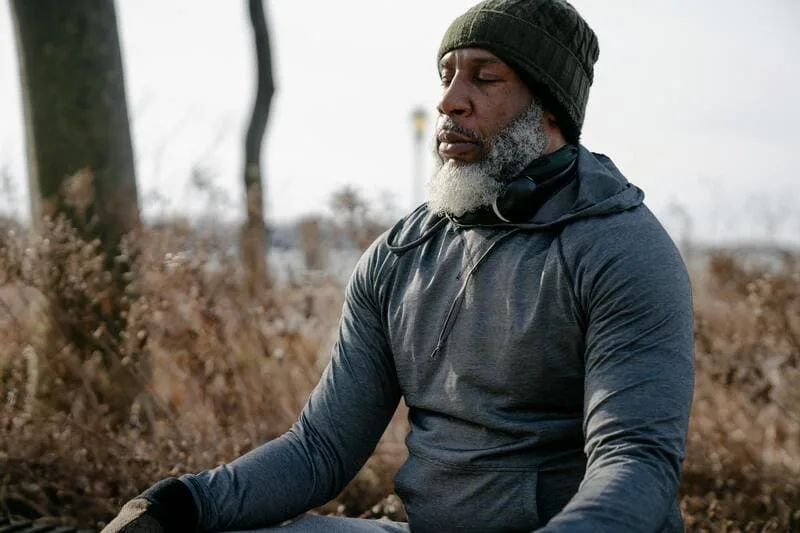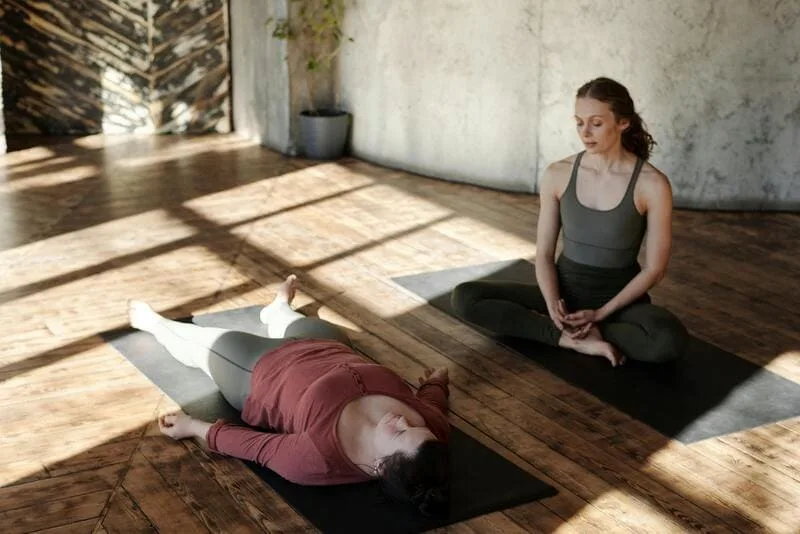Experiencing flashbacks and emotional triggers can be an overwhelming challenge, often leading individuals to seek various coping strategies. Among these, meditation has emerged as a valuable tool. Find out how using meditation to cope with flashbacks can assist with these difficult experiences.
Understanding Flashbacks and Emotional Triggers

Flashbacks are intense, often disturbing, memories that seem to hijack our present moment.
They are common in individuals who have experienced traumatic events. On the other hand, emotional triggers evoke strong emotional reactions, usually rooted in past experiences or trauma.
The Science Behind Meditation and Emotional Healing
Meditation is more than just a relaxation technique; it’s a practice that impacts our brain’s functioning. Using meditation to cope with flashbacks and emotional triggers with regular practice can alter brain regions associated with memory, empathy, and stress response.
Meditating is not just about the moments of calm but about building resilience that extends beyond your meditation sessions. This resilience can translate into better handling of stressful situations and a more balanced emotional response. It’s like rewiring the brain to approach emotional challenges with a newfound strength and perspective.

Neurological Benefits
One significant benefit of meditation is its effect on the amygdala, the brain’s ‘fear center.’ Regular meditation can reduce the amygdala’s reactivity to emotional triggers. It also enhances the prefrontal cortex’s control over the amygdala, providing better emotional regulation. This neural dance between the amygdala and prefrontal cortex determines how we react to potential stressors or traumatic memories.
Calming the amygdala and strengthening the prefrontal cortex, meditation can lead to more thoughtful responses and less impulsive reactions to emotional stimuli, creating a sense of inner peace and stability.
Psychological Advantages
From a psychological perspective, meditation encourages mindfulness – a state of being present and aware without judgment.
This mindfulness can help individuals observe their flashbacks or emotional reactions without being overwhelmed.
By creating a space between the individual and their thoughts or feelings, using meditation to cope with flashbacks fosters a detachment that allows for more rational and less emotionally charged reactions. It’s like stepping back and viewing your thoughts as a spectator rather than an active participant, providing the clarity needed to navigate complex emotions with greater ease and understanding.
Types of Meditation for Coping with Flashbacks
There are various forms of meditation, and some may be more suited to managing flashbacks and emotional triggers than others. Here are a few types:
Mindfulness Meditation
Mindfulness meditation involves focusing on the present moment and observing thoughts and feelings without judgment. This practice can be particularly effective in helping individuals acknowledge their flashbacks without being consumed by them.
Grounding yourself in the present enables you to observe past experiences as just that – past, not dictating your present or future. This kind of meditation teaches you to accept and observe your feelings without necessarily acting on them, allowing for a healthier processing of past traumas and a more empowered approach to life’s challenges.

Loving-Kindness Meditation
Also known as Metta meditation, this practice involves directing feelings of love and kindness toward oneself and others. It can be especially helpful in cultivating compassion and understanding toward oneself, a vital aspect when dealing with difficult emotions and memories.
This form of meditation helps break down barriers of self-criticism and negative self-perception, which are often heightened during episodes of emotional triggers and flashbacks.
Repeatedly affirming positive wishes for yourself and others helps you internalize these sentiments, leading to a more compassionate and forgiving outlook. This practice is particularly effective for those who struggle with feelings of guilt, anger, or resentment, as it nurtures a sense of universal love and interconnectedness.
Body Scan Meditation
Body scan meditation involves slowly focusing attention on different parts of the body and noticing any physical sensations.
This type of meditation can be useful in grounding individuals during moments of intense emotional distress. Methodically shifting focus through various parts of the body, you become more attuned to the present moment, which helps you distance yourself from overwhelming emotions or flashbacks.
This technique can also help you understand how emotional stress manifests physically in your body. Recognizing these physical cues early on can help you better handle emotional responses.
Meditation's Role in Specialized Healing Processes
Meditation has become a transformative tool in specialized healing processes, especially addiction recovery, by offering a pathway to mental clarity and emotional balance. It offers a way to manage stress and emotions, which are key factors in overcoming substance dependence.
It teaches mindfulness, helping people recognize and cope with cravings without judgment, reducing relapse risks. Meditation during addiction recovery promotes emotional stability and self-awareness, which help with understanding and addressing the root causes of addiction.
By integrating meditation into recovery programs, people gain tools for emotional regulation and stress management, complementing traditional therapies. It encourages a positive mindset and resilience. Additionally, group meditation sessions foster a sense of community and support, which is crucial for long-term recovery success.
Meditation’s benefits for mental and physical health make it a valuable component of addiction healing processes.
Practical Tips for Using Meditation to Cope with Flashbacks
Start Small
If you’re new to using meditation to cope with flashbacks, start with short sessions, even just a few minutes a day. Gradually increase the duration as you feel more comfortable.
Create a Comfortable Space
Find a quiet, comfortable place where you can meditate without interruptions. This consistency helps in creating a safe space for your practice.
Utilize Guided Meditations
Guided meditations can be incredibly helpful for beginners. Many resources, including apps and websites, are available online that offer guided sessions specifically designed for trauma and emotional healing.

Be Patient and Consistent
Using meditation to cope with flashbacks and emotional triggers.is a skill that improves with practice. It’s important to be patient and consistent with your practice.
Integrating Meditation into Daily Life
Incorporating meditation into your daily routine can maximize its benefits. Here are some suggestions
- Try to meditate at the same time every day. This regularity helps in forming a habit and makes it easier to integrate meditation into your daily life
- When you notice an emotional trigger or the onset of a flashback, take a moment to engage in a brief meditation practice. This can help in managing the immediate emotional response
- While meditation is a powerful tool, it can be even more effective when used in combination with other therapeutic approaches like psychotherapy or cognitive-behavioral therapy
Using Meditation to Cope with Flashbacks — The Takeaway
Using meditation to cope with flashbacks and emotional triggers is a journey of patience, consistency, and self-compassion.
Understanding the benefits of meditation and integrating it into your daily routine can help you develop a stronger capacity to manage these challenges. It’s important to note that while meditation is a powerful tool, you should also seek professional help if you’re struggling with severe emotional distress or trauma.
As we’ve explored the diverse applications and benefits of meditation, from coping with flashbacks to aiding in addiction recovery, it’s clear that this practice can be a transformative tool in various aspects of emotional healing. Accessing the right resources can be incredibly beneficial to further support your meditation journey.
If you’re interested in using meditation to cope with flashbacks, deepening your meditation practice, or just getting started, Samavira offers free live guided meditations.
These sessions are tailored to help you navigate emotional challenges and enhance your overall well-being. Sign up for free at Samavira Meditation and start your journey toward a more mindful and balanced life.







